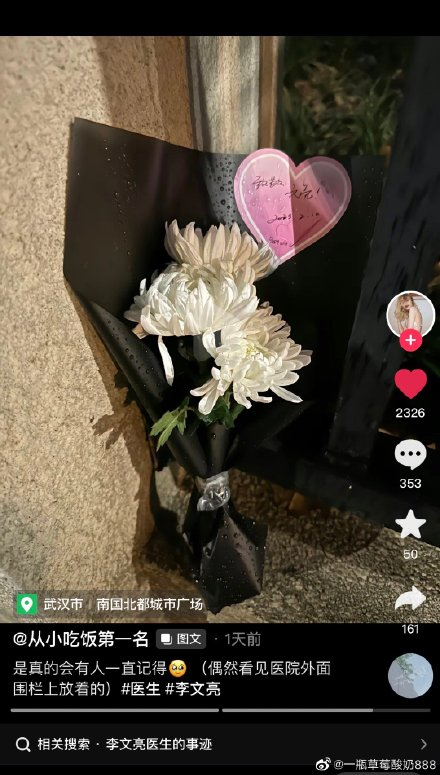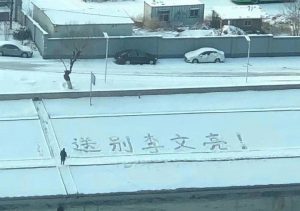When we talk about the landmark event of the COVID-19 era in China, the name Li Wenliang 李文亮 comes to mind for many. The death of this ‘whistle-blower’ is seen as the trigger for the first wave of an internet rebellion in China against the government’s failed handling of the initial phase of the epidemic.
Dr Li had worked at Wuhan Central Hospital for over ten years. On the afternoon of December 30, 2019, he posted a message warning in a group chat of fellow graduates of Wuhan University, alerting his colleagues and former classmates that a ‘new virus similar to atypical pneumonia (SARS)’ was spreading significantly in Wuhan, but cautiously warning the group members to ‘not spread the word’. The following day, Chinese authorities alerted the World Health Organisation about the mysterious illness, but didn’t acknowledge the seriousness of the outbreak. Dr Li was detained on 1 January and accused of ‘rumour-mongering’. On 3 January he was released after signing a ‘Letter of Discipline’ 训诫书 (see Figure 1) issued by the Wuhan Municipal Public Security Bureau. His original post had warned colleagues to wear masks and other protective equipment, but authorities refused to allow such measures to prevent panic. Then, on 11 January 2020, Dr Li, who had been treating infected patients, developed a cough and soon after, a fever. His condition rapidly deteriorated and he was placed in isolation in the Respiratory Department and Intensive Care Unit (ICU) just two days later.

Figure 1 ‘Letter of Discipline’ Summary of content: You are now warned and admonished under the law about publishing untrue statements on the internet. The public security authorities wish you to discontinue this conduct. Can you do so? A: Yes. We hope you will reflect that if you continue with your illegal activities, you will be punished by the law, do you understand? A: Understood.
On 30 January, a week before he passed away, Dr Li participated an interview with Caixin Media in which he said: ‘A healthy society should not have only one voice’ 一个健康的社会不应该只有一种声音 (see Figure 2). He thanked people on social media for their support, saying it made him feel a little more ‘relaxed in my heart’. In this interview, Li also released this Letter of Discipline, along with his account of the entire process of being interrogated by the police, to the public. This prompted wide public discussion on Weibo. However, the COVID-19 epidemic was in its earliest stages and officials were still trying to block information about the true extent of the infection. So some of the public identified him, like the police, as a rumour-monger. On the other hand, many netizens argued that if officials had confirmed Li Wenliang’s information from the start and had been transparent with the public, the epidemic would not have got so out of control, with so many infections and deaths, and would not have had such a chaotic impact on the social order. Nonetheless, as the outbreak rapidly spread, he finally become known as a whistle-blower. Dr Li Wenliang passed away on 7 February 2020.

Figure 2 A bench in New York’s Central Park with the words ‘A healthy society should have more than one voice.’
Following Dr Li’s death, a massive outpouring of condolences erupted on Weibo, with the hashtag #DrLiWenliangDied# already having 1 billion views by the following day. People also took the campaign offline. In Figure 3, a Beijing resident wrote five Chinese characters in the snow to say ‘farewell to Li Wenliang’ 送别李文亮 and laid beside the last character to form an exclamation mark. The image received over a million likes on Weibo and became the origin of many memes, with people similarly making memes to express their condolences and anger.
Li Wenliang’s last blog post, published on Weibo 1 February 2020, became the site of what has become known as the ‘Wailing Wall’. As of October 2022 on Weibo, this blog had 281,000 re-posts, over 1 million replies, and 4.34 million likes. People are still writing comments there about their feelings, daily activities, and the impact COVID-19 has had on their lives. Yet, after three years, it appears that the authorities, who quickly claimed Dr Li for a martyr after his death, are gradually and artificially erasing his name from view. Moreover, people are themselves choosing to forget what Dr Li stood for, their initial anger at his death faded with time and turned into warm nostalgia and a sense of hope for the future.
The ‘Wailing Wall’
The ‘Wailing Wall’ originally referred to the remaining wall of the ancient Temple Mount in Jerusalem, where people come to pray, mourn for the ancient temple and the pain of exile. On Weibo, a platform which is highly regulated and censored, Dr Li Wenliang’s ‘Wailing Wall’ is a unique document in the sociocultural history of the epidemic in China over the last few years.
On the eve of the third anniversary of Dr Li’s death, the Chinese government implemented ‘Article 20’ 二十条 and ‘New Article 10’ 新十条 measures to improve the management of viral infections. This new policy, which came into effect on 8 January 2023, renamed novel coronavirus pneumonia as novel coronavirus infection and was accompanied by a significant relaxation of outbreak control policies. Since then, Chinese government propaganda has avoided COVID-19 and its related topics. One of the most obvious evidence of this is the 2023 Spring Festival Gala 春晚, the largest annual national celebration of the Chinese Lunar New Year. The gala usually features a number of comedic or other programmes summarising the lives of the people of the past year, but there is little mention of COVID-19-related topics, including Dr Li. One netizen also said in this regard in the comment section of Dr Li’s Weibo: ‘Not a word about COVID-19 at the Spring Festival Gala, an era that absurdly and inexplicably came to an end.’
Although many netizens still tweeted their condolences on the third anniversary of Dr Li’s death, the scale of the tribute has considerably diminished compared to the night three years ago. When searching for ‘Li Wenliang’ on Weibo, the latest blog posts are generally updated in days and are highly associated with the hashtag #2022isreallygone#.

Flowers found outside the hospital Dr Li used to work on the third anniversary of his death. Source: China Digital Times
As Li Wenliang’s Weibo account could be deleted at any time by the internet censorship authorities, the China Digital Times has been backing up a selection of messages left for him, and plans to do so until the account is closed. Within it, we can see thousands of people writing about their memories of their loved ones who lost their lives during the pandemic, how their lives have improved, and what they don’t want to forget about how their lives had been permanently changed by this pandemic.
The following comments are excerpts from the China Digital Times’ compilation of Dr. Li’s Weibo feed.
“世上没有从天而降的英雄,只有挺身而出的凡人。晚安。”
‘There are no heroes who appear out of nowhere, only mortals who step up to the plate. Good night.’
“李医生,感谢你,用温暖一直照亮人间。”
’Thank you, Dr. Li, for always lighting up the earth with your warmth.’
“生活基本回到了20年之前的样子,就像阳过后的身体,经过3年防疫,都需要些时间来恢复!看到这么多留言,很欣慰,大家没有忘记你,希望你在那里也好好的。”
‘Life is basically back to what it was before 2020, like a body that contracted COVID-19 and then recovered, after 3 years of battling the epidemic, it all takes some time to recover! It’s comforting to see so many messages, people haven’t forgotten you and I hope you are well in heaven.’
“李医生早,很久没来看你了,我二哥也在那边,你们都是善良可爱的人。”
‘Good morning Dr. Li, it has been a long time since I last visited you, my second brother has also gone to heaven, you were both kind and lovely people.’
“当我们谈论起你,反复回忆起你,你就在我们身边。”
‘When we talk about you and remember you over and over again, you never leave us.’
“你的评论区没有千篇一律的吹捧,没有陌生人间的恶语相向,不会担心被你拉黑,被删帖,现在还来这里的人大都是骨子里很善良且念旧的人吧,否则早就忘记了吧…善良的普通人在分享幸福、苦恼…希望这个夜里还没有睡的人明天都能顺利。”
‘Your comment section is free of a thousand blurbs, no bad language among strangers, no fear of being blocked by you or having their posts deleted…most of the people who still come here now are good and nostalgic at heart, otherwise they would have forgotten about it…good ordinary people sharing their happiness, misery…I hope all those who are still awake this night will have a good tomorrow.’
“有良心的人都聚在这里,如果这里被删,就是删了良心。”
‘People of conscience are gathered here, and if this place is censored, it’s censored conscience.’
The comments on the ‘Wailing Wall’ are a living historical record, as they convey a wealth of information about COVID-19 at different times and places. It’s notable that in contrast to the angry outpouring during the time of COVID-19, this year’s messages — including the shift in the official media following the policy, and the lower engagement of individual netizens with Li Wenliang’s third anniversary — were mostly centered around warm nostalgia ( memorials to the dead loved ones, lamenting the passage of time) and a sense of hope for the future. While people realise that Li Wenliang is inevitably being forgotten by the internet, they also have to accept the reality that anger that cannot bring about change can only fade with time and become part of the memory.



